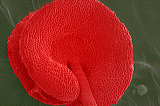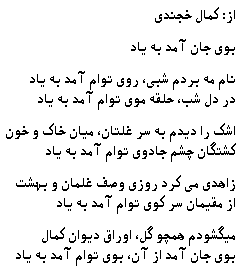Fragrance of Life
Some
evening when moon was my talking
The beauty
of your face, celestial came to mind

Deep in
darkness of night was my setting
Curls of
your hair, sable came to mind
Rolling
tears betwixt the dust and blood was my seeing
Martyrs of
your enchanted eyes, copious came to mind
Someday a
sage “younglings of Paradise” was his saying
Residents
of your hearth, eternal came to mind
Opening the pages of the Divan
of Kamal like blossoms
Fragrance
of life emanates thus your
scent, redolent came to mind
Concept:
Kamal saw all things
through the eyes of a lover. Be it late night worship or prolonged
loneliness or be it the slaughters he eye-witnessed during the Mongol
raids or be it in a lecture learning about hereafter. He saw nothing
but beauty and he found nothing but love in his heart.
In his unparalleled poetic
creations he started often with the attributes of a woman he adored and
then quickly within few verses admires the love and beauty of the
Creator. All the verses in this poem read about the beauty and
enchantment of a woman but suddenly the last verse deals with reminders
of the Creator.
In those days to those poets,
love was simply love and all love emanated from the love of supreme
Lover of the universe the Creator ITself. Therefore, a woman’s love
and affection was like a springboard to catapult a man towards his
Lord. Some of the Sufis believed that women are like a bridge to God
and indeed such is clear from Kamal’s work although he was not known to
have a
woman in his life!
Language: Farsi poets always used
singular Arabic words as ornaments to enhance the beauty and passion of
their work. In this poem the Arabic word Ghilman [52:24] is used,
in
such magnificence and mastery in the middle of a Farsi verse. It is
like a 'pin' preserving the beauty of a rare butterfly for generations
to
behold. The Arabs rarely use this word and its rarity makes it like a
jewel.
52:24 And round about them will serve, (devoted) to them. Youths
(Ghilman) as Pearls well-guarded.
وَيَطُوفُ
عَلَيْهِمْ غِلْمَانٌ
لَهُمْ كَأَنَّهُمْ لُؤْلُؤٌ مَكْنُونٌ

Background
©
2008-2002,
Dara O Shayda




